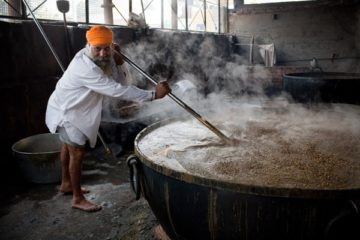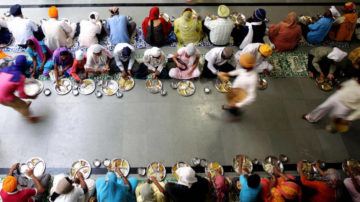by Leanne Ogasawara

1.
The sound of thousands of clattering stainless steel plates and bowls ripple across the water, as hundreds line up to enter the Golden Temple in Amritsar. Built atop a platform in the middle of a pool of water, this is the holiest shrine of the Sikh religion. Pilgrims arrive at the floating “Abode of God” walking slowly across a very crowded covered-causeway.
Just when you think nothing can be done to repair the world, you stand in awe as thousands are fed in the great communal kitchens of the temple.
The numbers are staggering. An army of volunteers show up every morning to chop vegetables, peel garlic, and fry roti. This in preparation for feeding tens of thousands every day. Known as the Langar, this communal meal is an act of charity and love, open and free to all. And what’s more, you don’t have to travel all the way to Amritsar to experience a Langar, as it is practiced in all Sikh places of worship around the world. Sitting on the ground shoulder-to-shoulder so that all are equal, pilgrims are provided with sustenance, ensuring that none leave the temple hungry.
Anyone is welcome to eat and anyone is welcome to serve.
In her beautiful book, Be My Guest: Reflections on Food, Community, and the Meaning of Generosity, Priya Basil—who herself hails from a Sikh family—feels it is a shame the meaning of the word “hospitality” in English has come to be so firmly associated with the industry of hospitality, something which has conflated acts of generosity with capitalist entertainment. And she rightly asks:
“What does this say about us when a notion that long implied giving without getting any return becomes synonymous with paying for services that promise customer satisfaction or your money back?”
 2.
2.
I never thought much about the meaning of hospitality until I returned from Japan to California in mid-life.
In the home where I was raised in Los Angeles, we sat down as a family every night to meals my mom lovingly prepared. And several times a year, there were larger meals with extended family. My parents routinely went to dinner at neighbors’ homes, and my mom has been part of a monthly supper club for close to four decades now. Meeting with a group of long-time friends once a month, the group of ladies takes turns hosting a formal sit-down meal for the rest. Special requests are not taken and if someone doesn’t like one thing or another, they probably just push the offending food item quietly to the side. My mom insists that even after all these years, she doesn’t know if any of the ladies have certain dislikes or not, because no one mentions it. The important thing, she says, is that they break bread together.
“No one wants to make the meal be about themselves, right?”
And when I stand there speechless, she continues:
“It’s not a restaurant, right?”
In fact, in most places around the world, even in restaurants one doesn’t even have quite so many choices. Have you ever watched an American asking a French waiter to prepare a meal a certain way? Or someone on the Keto diet requesting their meal in Bangkok without rice? I have seen things like this countless times –and it never ends well…
This is not to suggest that everyone can—or even should– tolerate all foods.
Once I was invited to have lunch with two well-known scholars in Tokyo. One was a Canadian friend, who was living in Beijing but had come to Tokyo for a conference. His friend, who taught political philosophy at Tokyo University, invited us to his favorite restaurant for lunch. At one point the Japanese professor pushed a plate of “sea cucumber intestines, marinated” in front of us, and when I tried quietly avoiding the dish, my friend whispered: “What are you just off the boat?”
And, sure enough the next morning I woke up to an email from the Japanese professor, which ended in a mild scolding: 食は冒険です。(“Food is about adventure”) and he then extemporized a “humble aphorism:”
小生の格言: 人間とは、その人がこれまで食べてきたものの総体である。
“A human being is the sum total of everything they have eaten up till that time”…
Now, I ask you: what would Confucius say to that?
 3.
3.
To be a host is a challenge, but so too is being a guest!
As Priya Basil reminds us, ghos-ti is the Indo-European root, meaning all of the following: “stranger, guest, host.” And more signaled “someone with whom one has reciprocal duties of hospitality,” representing “a mutual exchange relationship highly important to ancient Indo-European society.”
It seems like such an ordinary word about an everyday experience. And yet, hospitality has become a burning topic in philosophical and political debates for a few decades now. Reasons for this could include, writes Judith Still in her book Derrida and Hospitality, the recent influxes in immigration into Europe, as well as the way the hospitality can inform conversations surrounding post-colonialism, nationalism, and reconciliation. For the last one, see Richard Kearney’s Guestbook Project.
As contemporary philosophers of hospitality like to point out, the words hospitality and hostility are also linked.
Although it is Derrida who is best-known for his philosophy of hospitality, his work was deeply influenced by Emmanuel Levinas. Like Derrida, Levinas was a French philosopher who hailed from elsewhere. Both coming to France as adults, they also shared a Jewish background. Levinas in particular was grounded in Talmudic scholarship and sought to redress what he believed was an over-focus on ontological issues in the European philosophical tradition. He was not interested in the endless pursuit of deducing ethical behaviors from abstract maxims–and instead aimed to turn this practice on its head. Such that, instead of a Kantian-style categorical imperative, which evaluates actions based on abstract notions of universalizability, Levinas grounded ethical behaviors in concrete and particular relationships. He did this using the host-guest relationship as primary. And he said that this welcoming must take place not just in the private space of the home but also in the public space of the homeland.
Derrida was greatly influenced by Levinas and wrote about a story he heard from Maurice Blanchot:
The Messiah was at the gates of Rome unrecognized, dressed in rags. But one man who recognized that this was the Messiah went up to him and asked him, ‘When will you come?’
Derrida did not believe any Messiah would ever come. And yet he insisted that this messianic structure was what opened human beings up to ethical goodness.
He called this the “impossibility of hospitality.” This does not mean hospitality is not possible, but rather that it becomes a kind of moving target that individuals and societies can negotiate, taking into account the conditional nature of inviting strangers in, weighing the risks involved.
Not surprisingly, Priya Basil also is interested in Derrida’s notion of “the impossibility of hospitality.” And she says, “We can’t feed everyone, but we also can’t feed no one.” That is also to say, while we maybe can’t let in all the world, we can’t close the door –or build walls– either.
“Isn’t there something between those two extremes,” she asks, “between people and between nations?”
Based in Berlin, Basil writes movingly of the way Germany opened its doors to the refugees from Syria and other war-torn countries. It was something that happened on the level of communities, she says, with many of her friends opening their homes to refugees and volunteering time to support the newcomers in settling into their new home. And she hastens to add that shared meals between Germans and immigrants formed a part of the the massive and praise-worthy “we can do this” (Wir schaffen das) efforts.
 4.
4.
Despite what social media might lead one to believe, we really can hold two ideas in our mind at the same time.
Yes, we understand we cannot feed everyone and fix the world. Germany’s Wir schaffen das welcome of nearly one million immigrants was not without its problems, and yet…. and yet.. does that mean we should just give up?
Basil is interested in concrete ways people are making a difference in their own lives. And these will be, by definition, moving targets, she says.
For example, in a post here in these pages two years ago, I pledged to reduce my carbon footprint by 20%. From a starting point of a fair amount of waste, it was not hard. I achieved my goal, but in the process, I saw how hard it was for me–a non-driver in Los Angeles– to reduce my reliance on Amazon. I also felt discouraged by leaf blowers. How could this practice which should have been so easy to address prove to be so frustratingly difficult to resolve in my own life? These are my personal new moving targets.
Baby steps, baby steps.
It is not unlike like the Japanese concept of Kaizen, which also is a method of ongoing and continued improvement. But instead of being concerned with efficiency these targets are about giving.
But how to do this on one’s own or as a family?
Basil is passionate about Peter Singer’s The Life You Can Save. Like me, she has long committed to giving away one percent of her pre-tax earnings. She quickly discovered how easy it was to achieve this goal, so now her moving target is a much bigger challenge: how to keep improving every year by competing against herself…! Many of us can give away one percent of our income or reduce their carbon footprint by twenty percent. Some of us can even do both. What comes next, however, is harder. And, of course, this kind of real change in repairing the world one person at a time is something that can be shared with others as encouragement and solidarity to accelerate the process. It has momentum. Basil is urging people to move beyond the endless repeating of diagnoses. After all, we already know what the problems are and that their endless repetition merely spreads anxiety and diffuses the will to act.
So, what can we do, Basil humbly acts.

5.
I am re-reading an interesting book by Andrew Shepherd, called The Gift of the Other: Levinas, Derrida and the Theology of Hospitality, in which the author sees the collapse of hospitality and neighborliness as a by-product of global capitalism:
The true threat to our communal ways of life are not foreigners but the dynamic of global capitalism: In the United States alone, the economic changes of the last several decades did more to destroy communal life in small cities than all the immigrants together.
In any system there are winners and losers. And global capitalism is no different. The system of global inclusion is itself built, Shepherd suggests, on what is a persistent practice of exclusion. This occurs in three ways: by assimilation and elimination (through neo-liberal markets), by domination (through foreign policy) and by abandonment. Being the only economic game in town, you are either with the system or you are against the system and those who are not successfully engaged in production and consumption in the global village can find themselves in the very precarious role of migrant, refugee or what Shepherd describes as abandonment.
I think it is undeniable that the stakes have become very high even for those in the privileged centers. People are hunkering down behind gates or in their McMansions. In the US, I would argue that we have never been more risk-averse (as Derrida points out, hospitality is a very risky business).
One thing Priya Basil said really struck me:
The way we cook for and eat with others is one of the most tangible, quotidian ways of measuring generosity.
I had to stop and really think about that one. Stories, cookbooks, philanthropy, translations–all of these things are forms of hospitality. But meals are tough. As I grow older I do feel that time spent with family and friends around the table is more precious than anything in the world. For as Michael Pollan says in his film, Cooked, “This is more important than people realize.” This was surely a big part of Anthony Bourdain’s message.
And I love cookbooks with stories, like Venice and anything by Fushia Dunlop and Matt Goulding. And Dishoom.
But I wonder: in a world trending toward meals as another form of individual identity expression, are shared meals becoming a lost art? For how are we ever going to get along is we can’t even receive hospitality with grace, much less give it?
++
Don’t miss: Be My Guest: Reflections on Food, Community, and the Meaning of Generosity, by Priya Basil
School Lunch in Japan – It’s Not Just About Eating!
For more: See my Mini-Syllabus on Hospitality
